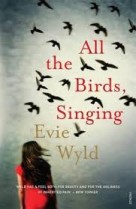All the Birds, Singing gathers pace as it steams towards its well-executed denouement. Hints are dropped like scat through the first half of the novel about why Jake Whyte is such a cagey, jittery character and carries such horrific scars on her back. The last half takes us more fully into the early experiences that shaped and maimed her. The final chapters include a surprise ending that delivers a punch to the guts.
When readers are first introduced to Jake, she is a sheep farmer living in a cottage on an island in the UK away from prying eyes.
She’s young, she’s a woman and she’s Australian — which is unusual for a farm owner in the area.
Something is killing her sheep but she doesn’t know what.
From time to time Jake catches glimpses of a dark presence she blames for the killings.
Despite her bravado when talking to the men in the pub or in the paddocks, she’s spooked.
Jake has also been a roustabout and shearer in Australia — having learnt from an old man called Otto how to hold the shears and cut in close.
At one point in her life, when she was down on her luck and extremely vulnerable, Otto had propositioned her about going to live with him. Living with him was better, at least at first, than what she’d escaped from.
Jake says that, “even in those moments when I’m searching the sky for an airplane, I think I can’t complain, because it’s been worse, much worse.”
She bears the suffocation and sexual subservience for a while.
Then things change.
“I feel the pull of being alone, of answering to no one, the safety of being unknown and far away.”
Murky malevolence
For much of the novel, Jake is frightened and on the run. She has nightmares that a threatening figure is standing or crouching behind her. She runs the tap on lit cigarettes to ensure the flame is properly extinguished. She’s skittish about other people’s carelessness.
She gets unnerved when Don, the farmer (from whom she bought her farm and cottage) tells her his son Samson was in Borstal but has been released and is wandering the area.
Samson, she learns, had reacted to his mother’s death by burning cars, the barn, and the cottage while Don was in it.
As a shearer, Jake is a woman in a man’s world. It’s tough — and she toughens herself to meet the challenges — but it’s easier than living in a place where she can more easily be found or exposed.
On her own farm, she chooses to have only Dog to keep her company. That is, until a man called Lloyd shows up and dosses in her barn. Her first instinct is to toss him out, her second to invite him in.
Lloyd has his own painful past so he and Jake make an odd pair. There is a sense, however, that in their brokenness they can provide one another with some of the comfort and support they need.
Lloyd helps Jake with some practical chores and is one of only a few men Jake has ever trusted. Most other males from her childhood onward have been at turns deeply disappointing, hard-nosed, misogynist, selfish and/or downright vicious.
The malevolence of whatever Jake believes is menacing the sheep blends murkily with the menace of the males who’ve hurt her or make her wary.
Beaten by a blow
There is a sense throughout the book that the Australian landscape is antagonistic toward white people and could, in part, explain some of these interlopers’ roughness.
Jake’s prostitute friend Karen says that at 22 she has already had a skin cancer burnt off her face — evidence, to her, of the land’s brutality.
“The main point is, we’re not supposed to be here us whiteys. The place is trying to spit us out all the time …we shouldn’t have come to Australia to start with. Look at us — crusted with skin cancers. The sea wants to kill us. The bush wants to kill us.”
Among others, the scenes where a young man catches his hand in a grinder and where Jake has to kill with a crowbar a roo she hit while driving show just how gritty life in Australia (including Western Australia and the Top End, where a lot of the narrative takes place) can be.
The sheep-shearing scenes are also vivid and informative.
Jake is an interesting female character and yet I found it hard to warm to her. I was relieved when this changed in the last few chapters as her desperate circumstances drew my sympathy.
I also found the novel’s timeframes confusing. This may have arisen because I was reading the book electronically. I had a much greater sense of who was who and who did what and when once I’d skimmed the book again after my first close reading. I skimmed it backwards and this helped my comprehension enormously.
All the Birds, Singing is not the easiest book to read due to its harsh themes and scarred central character; though Wyld’s spare and exacting style suits her subject matter. I wondered for a while if the last few chapters had started out as a stand-alone short story as they don’t fit totally snugly with the rest of the narrative. They do, however, give the book a powerful ending and their energy, precision and perfect pacing make the book well worth a look.




Recent Comments